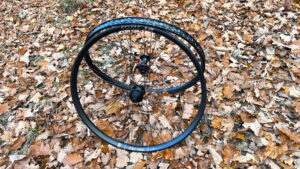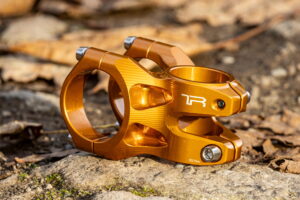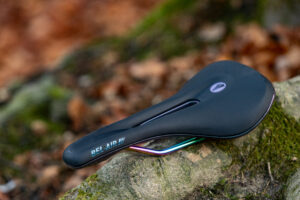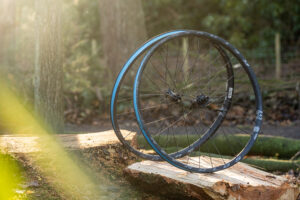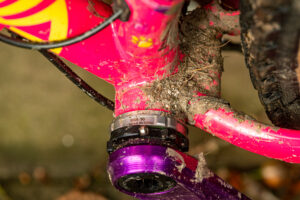The Yari is stiff, but it is carrying a bit of extra weight.
RockShox Yari RC 140mm review
Like the Pike, RockShox’s Yari is available in 27.5 and 29in wheel sizes and lots of travel options — we actually tested the 160mm version of this fork last year.
Above: RockShox Yari first look
It’s a budget model, so uses the Motion Control damper rather than the flagship Charger unit found in the Pike, and it’s a couple of grams heavier too.

Basic on and off compression = affordable price tag
The weight difference is in the thicker-walled 35mm stanchions and the slightly fatter fork crown.
The lowers feature RockShox’s Torque Cap-compatible dropouts. These are designed to take the 31mm oversized hub end caps (tons of companies make them), which add stiffness.
The recesses work fine with normal end caps, but the Maxle QR is much easier to install if you have Torque Caps fitted.
To improve small-bump sensitivity, the Yari uses the RockShox’s Solo Air spring, but has a much stronger negative spring than the Pike.
This means it feels softer initially. For a bit more support we increased the spring pressure and added an extra token.
The fork has two damping adjustments — a rebound dial and a simple twist-style compression lockout.

Rebound dialled in with simple adjuster
With the latter we’d like to see a lever rather than a dial, but it’s easy to lock the fork out, just not that quick.
Everything you need to set this fork up is on the legs — there’s an air pressure chart on the left leg and sag gradients on the stanchions.
Setting up the Yari was an absolute doddle and, like most RockShox forks, it’s almost impossible to get a bad set-up.
Although the Motion Control damper in the Yari is less sophisticated than the Pike’s Charger, it was only when going full tilt down rocky tracks or root-strewn descents that we felt some harshness.
On flatter terrain, or gently undulating trails, the Yari felt compliant and really responsive.

With its 35mm stanchions and deeper crown, the Yari is stiff, but because it’s essentially a 180mm fork stepped down to 140mm, it is carrying a bit of extra weight.
In this shorter travel guise, we also felt the Yari wasn’t quite as good as the 160mm we tested in August 2016.
That said, it’s a cinch to set up and a great choice if you’re looking for a burly 140mm trail fork with a ton of upgrade potential.










